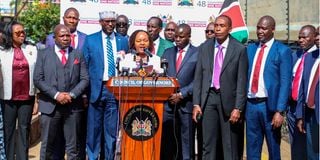Premium
Counties face cash crunch as MPs bicker over revenue Bill

Members of the National Assembly during a past sitting in Nairobi.
What you need to know:
- What is at dispute is the proposed addition of Sh24.8 billion to counties by senators in the next financial year, a proposal that MPs have rejected.
- The National Assembly last month approved Sh391.1 billion as equitable share to counties as had been proposed by the National Treasury.
Counties are staring at a major cash crunch should Parliament fail to hammer a deal on cash allocation to the devolved units.
The latest development follows a deadlock between the National Assembly and the Senate over equitable share of revenue due to county governments with the impasse now headed for mediation.
What is at dispute is the proposed addition of Sh24.8 billion to counties by senators in the next financial year, a proposal that MPs have rejected.
The National Assembly last month approved Sh391.1 billion as equitable share to counties as had been proposed by the National Treasury.
However, senators rejected the allocation contained in the Division of Revenue Bill, 2024, and proposed that the 47 county governments be allocated Sh415.9 billion.
The senators’ amendment adjusted the allocation to counties by Sh24.8 billion. They said the figure of Sh391.1 billion will increase counties’ allocation by a paltry Sh5.6 billion.
The Senate Finance and Budget Committee said there was no way counties would only get an increase of Sh5.6 billion in equitable revenue share whereas they had non-discretionary financial obligations adding up to more than Sh34 billion.
The committee chairperson, Mandera Senator Ali Roba, defended their stand, saying the county governments will inherit on their payroll Sh4 billion in housing levy, Sh3 billion in enhanced National Social and Security Fund (NSSF) contributions and Sh5.3 billion for county aggregation and industrial parks.
Further, the counties will also cater for community health promoters’ payment to the tune of Sh3.23 billion, Sh5.64 billion for medical equipment services, and Sh2.85 billion towards the Integrated Payroll and Personnel Database.

Council of Governors (CoG) Chairperson Anne Waiguru joined by other governors at a past press briefing.
There is also the Sh5.8 billion to cater for the doctors’ Collective Bargaining Agreement (CBA) signed up to 2024. However, the National Assembly Budget and Appropriations committee rejected the amendments from the Senate on Monday, resulting in the current standoff.
The committee chairperson Kiharu MP Ndindi Nyoro said the budget policy statement had a budget of Sh4.18 trillion which was later slashed by close to Sh270 billion to reduce the figure to Sh3.91 trillion.
He, however, said counties’ allocation of Sh391.1 billion still stood despite the slash. “Even as we support our county governments, our country and devolved governments operate on a fixed and thin resource envelope,” said Mr Nyoro.
“We are dealing with a budget deficit and whatever amount of money we may want to add to the counties over and above the Sh391.1 billion, certain votes and expenditure lines have to give,” he added.
He said that for the Sh24.8 billion gap to be bridged, then it will mean slashing Sh10 billion each from the road maintenance levy fund and National Government Constituency Development Fund (NG-CDF), proposals the committee rejected.
“I request this House to reject the proposed amendments by the Senate so that we proceed to mediation so that we are able to safeguard critical areas that we have already ring-fenced,” said Mr Nyoro.
His vice chairperson Teso South MP Mary Emase added: “We cannot accept this proposal and the committee advises we reject the proposal.”
During a heated debate in the National Assembly, MPs went on to reject the Senate amendment despite opposition from Azimio.
Majority Leader Kimani Ichung’wah agreed with the committee, adding that several votes, especially the NG-CDF and National Government Affirmative Action Fund (NGAAF) risked suffering massive cuts. “If we were to agree with the senate this afternoon, something else must give way. How then do we allow amendments that are coming to take away money from NGAAF?” posed Mr Ichung’wah.
“It will be an injustice to the people of Kenya in terms of provision of bursaries and social welfare,” he added.
But Suna East MP Junet Mohamed supported the Senate amendment, saying senators only asked for an increment to the allocation to counties, even as he urged the House not to be used to kill devolution.
“The Senate has only asked for an increment ,but never said we remove money from those areas being mentioned. Money is still being held in Nairobi for devolved functions like in agriculture and health. Why don’t we send this money to the counties?” asked Mr Mohamed.
“You cannot deny counties money in the pretext of corruption. We are only devolving 15 per cent of our national cake to counties and this is still stifling devolution,” he added.
Also Read: Rich counties that have become ‘beggars’
Minority Leader Opiyo Wandayi said: “What the Senate amendments are saying is very simple and in layman’s language. That is, in our own calculations, the counties need much more than what you have allocated them.”

National Assembly Minority Leader Opiyo Wandayi.
The clash over the allocation has triggered a standoff that now threatens to cause a cash crisis in the counties.
The Speakers of the two Houses have since referred the matter to a mediation committee, a process that would further delay the passage of the crucial Bill.
The law provides for the formation of a mediation committee consisting of an equal number of members from either House of Parliament to strike a consensus.
The High Court in 2020 ruled that the Division of Revenue Bill must be approved by Parliament before tabling of the Budget Estimates and reading of Budget speech by the Treasury Cabinet Secretary.
This implies that the counties would not be able to get exchequer releases until the Bill is approved by Parliament.
This is not the first time Parliament is facing a similar quagmire. The same dispute arose in 2017 and 2020.
In absence of the law, the National Treasury could advance cash to county governments as an administrative tool to prevent county operations from grinding to a halt. This happened in 2017.
On Tuesday, governors protested the move by the national assembly to deny counties an enhanced allocation.
The Council of Governors, through its Finance and Economic Planning Committee chairman Fernandes Barasa, faulted a section of MPs for ‘fighting’ devolution.
“I find fault with the National Assembly Budget Committee for rejecting senators’ proposal to increase the allocation to counties to Sh415 billion. Counties have medical equipment to be serviced and various other duties which have been devolved but not funded,” Mr Barasa said.
The Commission on Revenue Allocation had recommended a figure of Sh398 billion, while governors had demanded to be allocated Sh439.5 billion.





